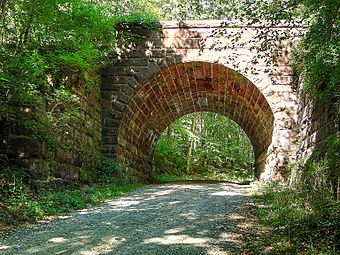River Road Stone Arch Railroad Bridge facts for kids
Quick facts for kids |
|
|
River Road Stone Arch Railroad Bridge
|
|
 |
|
| Location | River Rd. and former Air Line RR right-of-way, Colchester, Connecticut |
|---|---|
| Area | less than one acre |
| Built | 1887 |
| NRHP reference No. | 86002727 |
| Added to NRHP | August 21, 1986 |
The River Road Stone Arch Railroad Bridge is a very old bridge in Colchester, Connecticut. It used to carry the Air Line Railroad tracks over River Road. This bridge was built in 1887. It is a great example of a stone railroad bridge from that time. The state of Connecticut asked for bridges like this to be built. This helped to make train travel safer by reducing places where roads and train tracks crossed at the same level. The bridge was added to the National Register of Historic Places in 1986. This means it is an important historical site.
Contents
Discover the River Road Stone Arch Bridge
This section will tell you more about where the bridge is and what it looks like. You will also learn why it was built so long ago.
Where is This Bridge Located?
The River Road Stone Arch Railroad Bridge is in a quiet, natural area. It is found in the northwestern part of Colchester. This area is inside the Salmon River State Forest. River Road is a gravel road that runs next to the Blackledge River. The railroad path is between the river and the road. When the river and road turn, the railroad line crosses both. This bridge carries the railroad over River Road. Another bridge, the Blackledge River Railroad Bridge, carries the railroad over the river nearby.
What Does the Bridge Look Like?
This bridge is made from strong brownstone. The stones are carefully shaped and fitted together with mortar. It has a rounded arch shape. The arch is about 22 feet (6.7 meters) wide at its bottom. It stands about 18 feet (5.5 meters) high. The sides of the bridge rise about 4 feet (1.2 meters) above where the train tracks used to be. All four corners of the bridge have special walls. These are called wing walls. They help hold up the dirt banks that carry the railroad path.
Why Was This Bridge Built?
The Air Line Railway was created in the 1870s. It was meant to be a more direct route for trains. It connected New Haven, Connecticut to Boston, Massachusetts. It also went through Middletown. At first, trains and cars crossed paths at the same level. This is called a "grade crossing."
As trains started going faster, these crossings became dangerous. So, in 1887, the state of Connecticut made a rule. Railroad companies had to build bridges or tunnels. This would separate the train tracks from the roads. This bridge was built because of that rule. It was one of several similar bridges constructed around that time. The stones used for the arch have numbers on them. This suggests they were cut and shaped somewhere else. Then they were brought to the site and put together like a giant puzzle.



